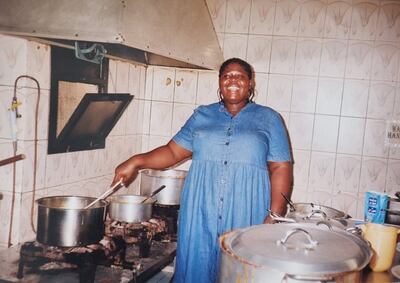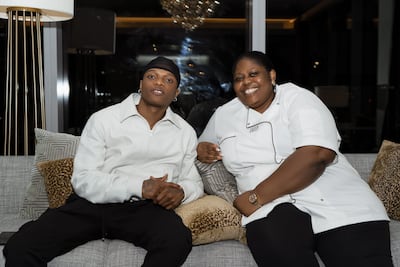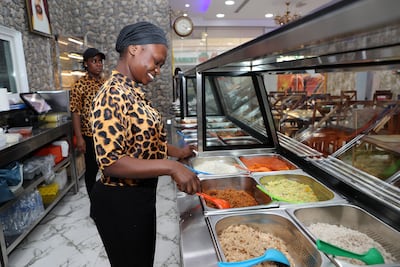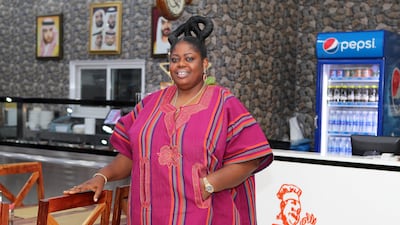A Nigerian expatriate who almost left Dubai due to a lack of funds and without a place to stay is today the proud owner of two of the most popular African restaurants in the city, with plans to open a third in the coming weeks.
Adeyinka Adeduro Fabiyi's journey from being a cook earning a modest Dh800 a month ($217) to becoming a successful restaurateur was incredibly challenging.
However, she attributes her success to her unwavering determination and patience.
"Dubai is a city of dreams, but it also tests your patience. If you are willing to make sacrifices, you will eventually find success," Ms Fabiyi, 50, affectionately known as 'Biggy,' told The National.

A towering figure, she said she earned the nickname 'Biggy' long before she arrived in Dubai.
"It was a random guy who called me 'Biggy' for the first time at an event in Nigeria. I used to cook at exhibitions and trade fairs but never had a brand name.
"My friends suggested that it was a good name to represent my food. From then on, my food and the first restaurant I opened in my hometown Lagos became known as 'Biggy'."
Today, 'Biggy' is not only a symbol of her remarkable journey but also the brand behind her thriving restaurant chain in Dubai, which she hopes to bring to other countries in the region.
Difficult start
While having a successful business in Nigeria, Ms Fabiyi decided to come to Dubai in 2004 after one of her cousins, who used to regularly travel to the emirate, convinced her to take up a job in a restaurant.
But little did she know that the restaurant would be a small, humble eatery in Deira where she would single-handedly have to manage every aspect, from grocery shopping to cooking and serving guests.
She said those two years were the hardest in her life.
"I thought I made the biggest mistake by giving up my restaurant in Nigeria and coming to Dubai.”
Distressed and with little money to show for her time in Dubai, Ms Fabiyi had decided to leave for good but her brother, who is a pastor in London, dissuaded her.

“He prayed for me and said, 'God sent you here. Dubai is your Jerusalem. This is where you belong'.
“He is a man of God. Maybe he knows what I don’t know. And I decided to stay, albeit reluctantly.”
First Biggy's in Dubai
Ms Fabiyi says that was the best decision of her life as things fell into place. A few years later and a job change in between, she opened her first Biggy restaurant in Blue Diamond Hotel in Deira in 2006.
She soon closed that restaurant but opened another one in Al Arraf Hotel, Deira in 2007.
Beginning with just one table, her restaurant grew in popularity, boasting ten tables today and is now one of Dubai's most renowned African restaurants.

In 2019, she expanded further by opening her second Biggy in Al Nahda, Dubai, with plans for a new branch in Dubai Marina soon.
The fame of Biggy’s has grown over the years and Ms Fabiyi’s clients include celebrities like Nigerian singer and playwright Wizkid and Emirati vlogger Khalid Al Ameri.
“My jollof rice is the most sought-after in town. Whenever we have African dignitaries or celebrities in town, they ask me to cook for them. I also cater for house and yacht parties,” she said.
With a total of 35 staff members working for her, Ms Fabiyi says her plan is to expand her restaurant chain throughout the GCC and popularise African food.
Even as her fortunes have grown, she says the lesson she learnt is never to run after quick money and to treat her employees well.
“What I have realised is that Dubai has all the rules to protect workers. It is bad employers who break these rules," Ms Fabiyi said.
“I suffered a lot because of that and I want to make sure that I don’t pass it over to my employees. I want to grow with the city and don’t give it a bad name by treating my people poorly.”


